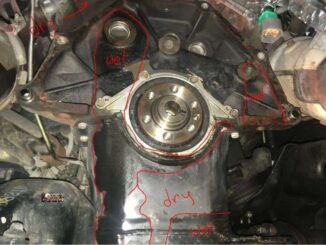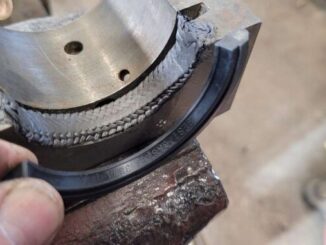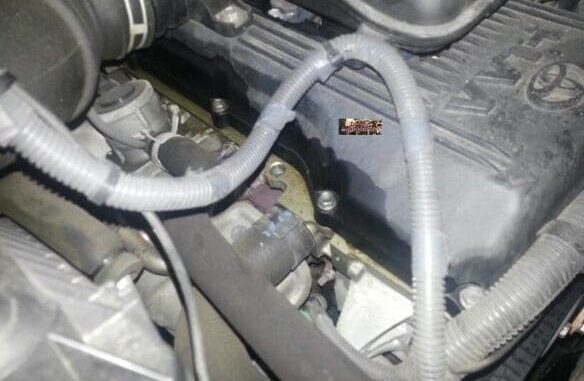
Stopping valve cover gasket leaks, between the valve cover and the cylinder head, is very important, for many reasons.
Above all, the valve cover gasket needs to do it’s job, without any flaws.
But, valve cover gasket leaks, are more common than you think. And, unlike the old days, it’s not just oil you should be concerned about.
Consequently, to help stop, valve cover gasket leaks, most valve cover gaskets today, are made from molded rubber.
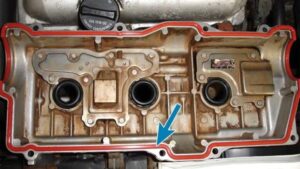
So, the valve cover gasket, is very delicate and prone to oil leaks. Consequently, over time, it becomes brittle and will crack, due to exposure to dirt, debris, heat and other elements. When this occurs, it can lose its integrity and leak. And, if not replaced in time, it can lead to complete engine failure. And, that can be as bad as a, cylinder head gasket leak.
Today, The Valve Cover Gasket, Has Several Important Functions:
- It protects cylinder head parts, from the elements.
- Stops important lubricating oil, from leaking externally.
- Controls air leaks, to help promote proper (PCV) operation.
Actually, Finding Valve Cover Gasket Leaks, Is Easier Than You Think
Luckily, valve cover gasket leaks, can be pretty easy to find. Firstly, the valve cover gasket, is almost always, the highest seal in the engine. Unlike the rear main seal, at the bottom of the engine.

So, if a vehicle’s oil is not changed often enough, sludge develops. As a result, clogging the drainage holes and placing a lot of pressure on the gasket. So, when the gasket is unable to function properly, engine oil leaks often occur.
Always Start With A Visual Inspection And Look For:
- Loose or missing, bolts or screws.
- Cracks, in the valve cover.
- Part of the gasket sticking out, from under the valve cover.
- Evidence of a leak, in the form of oil or black residue, around the edge of the valve cover.
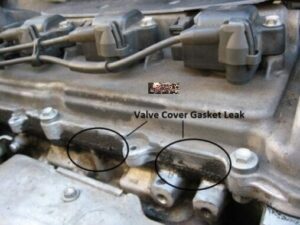
Above all, once you’ve confirmed you have a leak, you need to decide how to move forward.
If you have a missing bolt or screw, it should be replaced immediately. Make sure to torque the bolts, to the factory recommended torque. Consequently, if you tighten them too much, you can risk breaking the valve cover, and too loose, they can leak.
Common Warning Signs, Of A Failing Valve Cover Gasket Include:
The Smell Of Burning Oil
While the engine is running, the excess oil will drip on other components. These are all hot components, that will burn the oil and produce, a burning oil smell that is easily recognizable.
Valve Cover Is “Caked” With Dirt And Is Leaking Oil
The first sign of this problem, is when the valve cover/cylinder head is very dirty. Because, oil attracts dirt and will appear to be “caked” on where its leaking.
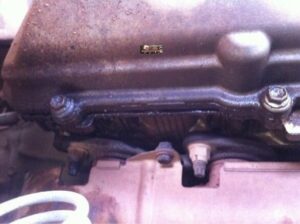
So, if you discover that the valve cover is dirty, it’s most likely a leaking gasket.
Oil Level Is Low
Any oil leak, reduces the amount of oil in the oil pan. And, if this happens often, it can cause the engine oil light, to come on. Furthermore, if the engine oil is low, it will reduce its ability, to properly lubricate internal engine components. Above all, this can build up excessive heat, inside the engine and cause serious engine damage.
Engine Is Misfiring
IMPORTANT NOTE – Sometimes, oil can leak in to the spark plug tube and eventually, seep inside the spark plug well.
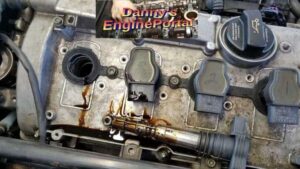
As a result, this will cause a engine misfire or reduce engine performance. Even worse, it can also cause a fire under your hood, if it is not repaired.
Conclusion
So, proper, regular maintenance and routine oil changes, can help reduce many problems. Consequently, helping you avoid, further damage to primary engine components, essentially preventing damage and leaks, before they happen.
Thank You !


